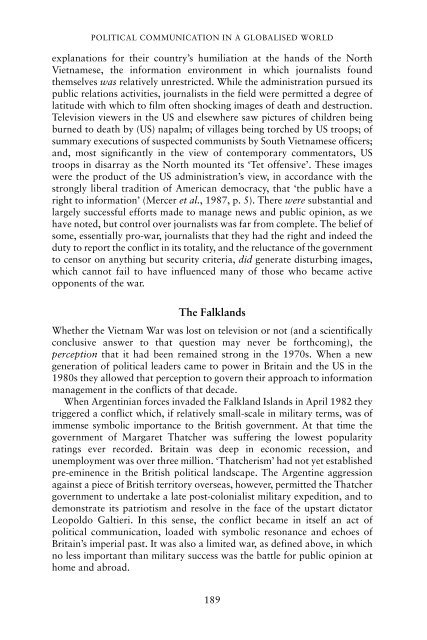20130412164339753295_book_an-introduction-to-political-communication
20130412164339753295_book_an-introduction-to-political-communication
20130412164339753295_book_an-introduction-to-political-communication
You also want an ePaper? Increase the reach of your titles
YUMPU automatically turns print PDFs into web optimized ePapers that Google loves.
POLITICAL COMMUNICATION IN A GLOBALISED WORLD<br />
expl<strong>an</strong>ations for their country’s humiliation at the h<strong>an</strong>ds of the North<br />
Vietnamese, the information environment in which journalists found<br />
themselves was relatively unrestricted. While the administration pursued its<br />
public relations activities, journalists in the field were permitted a degree of<br />
latitude with which <strong>to</strong> film often shocking images of death <strong>an</strong>d destruction.<br />
Television viewers in the US <strong>an</strong>d elsewhere saw pictures of children being<br />
burned <strong>to</strong> death by (US) napalm; of villages being <strong>to</strong>rched by US troops; of<br />
summary executions of suspected communists by South Vietnamese officers;<br />
<strong>an</strong>d, most signific<strong>an</strong>tly in the view of contemporary commenta<strong>to</strong>rs, US<br />
troops in disarray as the North mounted its ‘Tet offensive’. These images<br />
were the product of the US administration’s view, in accord<strong>an</strong>ce with the<br />
strongly liberal tradition of Americ<strong>an</strong> democracy, that ‘the public have a<br />
right <strong>to</strong> information’ (Mercer et al., 1987, p. 5). There were subst<strong>an</strong>tial <strong>an</strong>d<br />
largely successful efforts made <strong>to</strong> m<strong>an</strong>age news <strong>an</strong>d public opinion, as we<br />
have noted, but control over journalists was far from complete. The belief of<br />
some, essentially pro-war, journalists that they had the right <strong>an</strong>d indeed the<br />
duty <strong>to</strong> report the conflict in its <strong>to</strong>tality, <strong>an</strong>d the reluct<strong>an</strong>ce of the government<br />
<strong>to</strong> censor on <strong>an</strong>ything but security criteria, did generate disturbing images,<br />
which c<strong>an</strong>not fail <strong>to</strong> have influenced m<strong>an</strong>y of those who became active<br />
opponents of the war.<br />
The Falkl<strong>an</strong>ds<br />
Whether the Vietnam War was lost on television or not (<strong>an</strong>d a scientifically<br />
conclusive <strong>an</strong>swer <strong>to</strong> that question may never be forthcoming), the<br />
perception that it had been remained strong in the 1970s. When a new<br />
generation of <strong>political</strong> leaders came <strong>to</strong> power in Britain <strong>an</strong>d the US in the<br />
1980s they allowed that perception <strong>to</strong> govern their approach <strong>to</strong> information<br />
m<strong>an</strong>agement in the conflicts of that decade.<br />
When Argentini<strong>an</strong> forces invaded the Falkl<strong>an</strong>d Isl<strong>an</strong>ds in April 1982 they<br />
triggered a conflict which, if relatively small-scale in military terms, was of<br />
immense symbolic import<strong>an</strong>ce <strong>to</strong> the British government. At that time the<br />
government of Margaret Thatcher was suffering the lowest popularity<br />
ratings ever recorded. Britain was deep in economic recession, <strong>an</strong>d<br />
unemployment was over three million. ‘Thatcherism’ had not yet established<br />
pre-eminence in the British <strong>political</strong> l<strong>an</strong>dscape. The Argentine aggression<br />
against a piece of British terri<strong>to</strong>ry overseas, however, permitted the Thatcher<br />
government <strong>to</strong> undertake a late post-colonialist military expedition, <strong>an</strong>d <strong>to</strong><br />
demonstrate its patriotism <strong>an</strong>d resolve in the face of the upstart dicta<strong>to</strong>r<br />
Leopoldo Galtieri. In this sense, the conflict became in itself <strong>an</strong> act of<br />
<strong>political</strong> <strong>communication</strong>, loaded with symbolic reson<strong>an</strong>ce <strong>an</strong>d echoes of<br />
Britain’s imperial past. It was also a limited war, as defined above, in which<br />
no less import<strong>an</strong>t th<strong>an</strong> military success was the battle for public opinion at<br />
home <strong>an</strong>d abroad.<br />
189
















